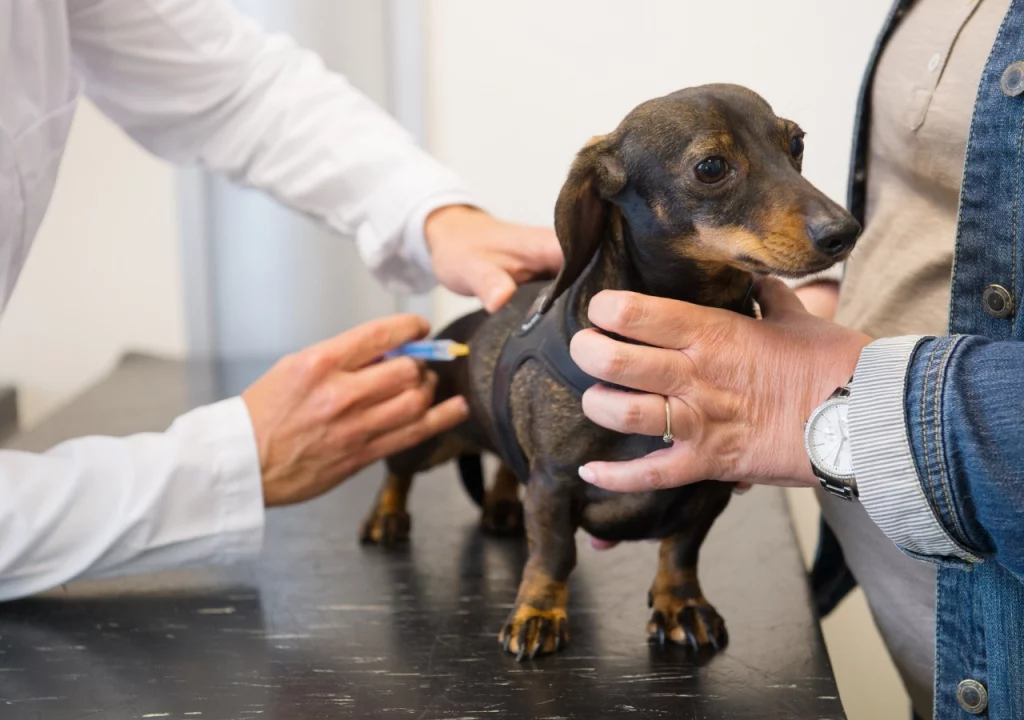Dachshunds face health issues like IVDD, obesity, and dental problems. Regular vet check-ups, a balanced diet, and exercise are key to their health.
This article will explore common health problems in Dachshunds, how to recognize them, and what you can do to keep your furry friend healthy.
Recognizing Health Issues in Dachshunds:

Dachshunds are susceptible to certain health problems because of their distinctive body shape.Their long spine and short legs can lead to problems that other breeds may not face. Understanding these potential issues is crucial for any Dachshund owner. Early detection and proper care can help manage these health concerns and improve your dog’s quality of life.
Common Health Problems in Dachshunds:
Here are some common health issues that Dachshunds may encounter:
Understanding Intervertebral Disc Disease (IVDD):
IVDD is a spinal condition that occurs when the discs between the vertebrae bulge or rupture. This condition is common in Dachshunds because of their long spines. It can lead to pain, difficulty walking, and even paralysis.
Signs of IVDD:
- Sudden reluctance to jump or play
- Weakness in the back legs
- Pain when touching the back
- A hunched back
Prevention and Treatment:
To prevent IVDD, it’s essential to avoid letting your Dachshund jumpigh places. from hMaintaining your dog’s healthy weight can also lower the risk.
If you notice any signs of IVDD, consult your veterinarian immediately. Treatment may include medication, rest, or, in severe cases, surgery.
Also read: Is Sodium Erythorbate Bad For Your Health – A complete Guide!
Obesity:
What is Obesity?
Obesity is a common problem in many dog breeds, including Dachshunds. Overweight dogs are at risk for various health issues, including diabetes, heart disease, and joint problems.
Signs of Obesity:
- Difficulty in walking or playing
- A noticeable belly
- Difficulty breathing
Prevention and Treatment:
To prevent obesity, feed your Dachshund a balanced diet and ensure they get enough exercise. Taking regular walks and engaging in playtime are crucial.If your dog is already overweight, consult your vet for a proper weight loss plan that includes diet and exercise.
Dental Problems:
What are Dental Problems?
Dachshunds are prone to dental issues due to their small mouths. They can develop tartar buildup, gum disease, and tooth decay if their teeth are not cared for properly.
Signs of Dental Problems:
- Bad breath
- Difficulty eating
- Red or swollen gums
Prevention and Treatment:
To prevent dental problems, brush your Dachshund’s teeth regularly with dog-safe toothpaste. Giving dental chews can also be beneficial. If you notice any signs of dental issues, take your dog to the vet for a check-up and cleaning.
Eye Problems:

What are Eye Problems?
Dachshunds can experience various eye issues, such as cataracts and progressive retinal atrophy (PRA).If left untreated, these conditions can result in vision loss.
Signs of Eye Problems:
- Cloudy eyes
- Difficulty seeing in low light
- Squinting or redness in the eyes
Prevention and Treatment:
Regular veterinary check-ups can help catch eye problems early. If you notice any signs of vision issues, consult your vet. Treatment options may include medication or surgery, depending on the condition.
Skin Issues:
What are Skin Issues?
Dachshunds can develop skin problems, including allergies, hot spots, and infections. These problems can lead to itching, redness, and discomfort.
Signs of Skin Issues:
- Excessive scratching or licking
- Red or inflamed skin
- Bald patches or scabs
Prevention and Treatment:
To prevent skin issues, keep your Dachshund clean and well-groomed. Regular baths and brushing can help remove dirt and allergens. If you notice any signs of skin problems, consult your vet for appropriate treatment.
Also read: Is The $6400 Health Subsidy Real – A Complete Guide!
How to Keep Your Dachshund Healthy:
Regular Veterinary Check-ups:
Taking your Dachshund to the vet at least once a year is vital for early detection of health problems. During these visits, the vet will provide necessary vaccinations and dental care to maintain their health. Regular check-ups also allow for monitoring any changes in their well-being, ensuring they receive the best care possible.
Balanced Diet:

A balanced diet is crucial for your Dachshund’s overall health and vitality. Opt for high-quality dog food that meets their specific nutritional needs, and be mindful of the quantity you serve. Limiting treats and table scraps helps prevent obesity, ensuring your Dachshund maintains a healthy weight and energy level.
Exercise:
Daily exercise is essential to keep your Dachshund fit and mentally stimulated. Activities such as walks, playtime, and engaging games like fetch contribute to their physical health and prevent weight gain. Regular exercise also helps alleviate behavioral issues stemming from boredom or pent-up energy.
Grooming:
Regular grooming is important for maintaining your Dachshund’s coat and overall hygiene. Brush their fur frequently to remove loose hair and dirt, and check their ears for wax buildup to prevent infections. A clean and well-groomed dog is more comfortable and less prone to skin and ear issues.
Weight Management:
Keeping your Dachshund at a healthy weight is crucial for their long-term health and well-being. Monitor their food intake carefully and encourage regular exercise to avoid obesity-related issues. If your dog is overweight, consult your veterinarian for guidance on a weight management plan that suits their needs.
Also read: Moved To Florida Months Ago Can I Get Health Insurance – A Complete Guide!
Training and Socialization:
Training your Dachshund fosters good behavior and can help reduce anxiety and aggression. Engaging them in socialization activities with other pets and people boosts their confidence and adaptability. A well-trained and socially adjusted dog is generally happier and easier to manage in various situations.
Recognizing Signs of Illness:
Being familiar with your Dachshund’s normal behavior is crucial for identifying potential health issues. Here are some general signs of illness to keep an eye on:
Changes in Appetite or Drinking Habits:

A sudden increase or decrease in your Dachshund’s appetite can indicate underlying health problems. If they refuse to eat or drink for more than 24 hours, it could be a sign of dental issues, gastrointestinal problems, or other serious conditions. Monitoring their food and water intake helps ensure they are receiving the nutrition and hydration they need.
Lethargy or Reduced Activity:
If your usually energetic Dachshund becomes unusually tired or inactive, it may signal an illness. Lethargy can be associated with various health concerns, including infections, pain, or chronic diseases. Take note of any significant changes in their activity levels, and consider if they are still engaging in their favorite activities or if they seem withdrawn.
Vomiting or Diarrhea:
Occasional vomiting or diarrhea may not be cause for immediate concern, but persistent or severe cases warrant attention. These symptoms can indicate dietary indiscretion, infections, or more serious gastrointestinal issues. Keep an eye on the frequency and severity of these symptoms, and consult your veterinarian if they persist for more than a day or two.
Also read: What Are Important Aspects Of Your Health – A Complete Guide!
Coughing or Difficulty Breathing:
Coughing or signs of respiratory distress, such as wheezing or labored breathing, can indicate serious health issues, including respiratory infections or heart problems. If your Dachshund exhibits coughing that is persistent or severe, or if they struggle to breathe, it’s crucial to seek veterinary care promptly. Timely intervention can greatly impact the results of treatment.
Any Noticeable Changes in Behavior:
Any sudden or unexplained changes in your Dachshund’s behavior—such as increased aggression, withdrawal, or excessive vocalization—can be a sign of discomfort or illness. These behavioral changes may indicate pain, anxiety, or other health issues that require attention. Observing and documenting these changes can help your veterinarian assess the situation more effectively.
If you observe any of these signs, it’s essential to consult your veterinarian promptly for a thorough evaluation. Early detection and treatment can significantly improve your Dachshund’s health and well-being.
FAQ’s
1. What is Intervertebral Disc Disease (IVDD) in Dachshunds?
IVDD is a spinal condition where discs between the vertebrae bulge or rupture, causing pain and mobility issues. It’s common in Dachshunds due to their long spines.
2. What steps can I take to prevent obesity in my Dachshund?
Prevent obesity by feeding a balanced diet, controlling portion sizes, and ensuring regular exercise through walks and playtime.
3. What signs indicate dental problems in Dachshunds?
Signs of dental issues include bad breath, difficulty eating, and swollen gums. Regular dental care is essential to prevent these problems.
4. How can I recognize eye problems in my Dachshund?
Eye problems may present as cloudy eyes, difficulty seeing, or redness. Regular vet check-ups can help catch these issues early.
5. What should I do if my Dachshund shows signs of illness?
If your Dachshund shows signs like lethargy, vomiting, or changes in behavior, consult your veterinarian promptly for evaluation and treatment.
Conclusion
In summary, Dachshunds face various health issues, including IVDD, obesity, dental problems, eye conditions, and skin issues, which can affect their quality of life. Recognizing the signs and seeking timely veterinary care is essential for their well-being. By providing a balanced diet, regular exercise, and proper grooming, owners can help their Dachshunds live healthier lives.




